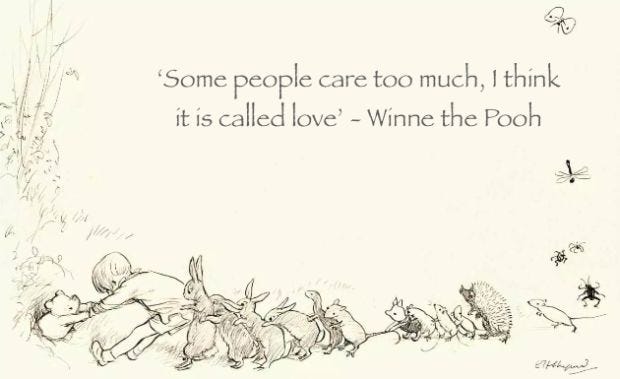When I voice a question or reality that shifts a conversation from the daily political chit-chat to a unsettling moment that confronts us with the omnipresence of (necessary) collapse, I often feel like an annoying party pooper, disrupting the flow of life-as-usual. It can be an ungrateful, lonely and confrontational endeavour to hold space for collapse awareness, unravelling of beliefs and hospicing of privileges, certainties and truths. Simply doing what you have always done, without worrying too much about the consequences, feels safe, and you won’t always appreciate the person who disrupts this feeling of safety and comfort.
Being the Loving Unlovable
Most questioners, hospicers, unravellers and space holders I know are people who feel deeply, they are hurt to their core. Tired of the destruction, the blindness, the disconnection, the hate, or in other words, tired of the last increasingly aggressive, desperate twitches of modernity. (I can feel a constant aching, a heavy tiredness under my skin that tells me my nervous system is on fire, all day, every day. And that as a low-risk struggle, imagine all the people in the world who are truly risking their lives, fighting for their land, kin and ways of being.)
From this constant place of grief and pain, we hold on to love. Love for life, love for each other, love the next generations, love for the universe, love for the patterns of the ocean, for the wind, the butterflies, the spring flowers, the crying fields of barren soil. Those who choose to hold space for love; they see, they feel, they refuse to zombie through life, blind to the suffering of all beings. And from that place of love, questions are born that might annoy people because they stop them in the seemingly smooth tracks of their life-as-usual days.
The confluence of love and unsettlement
For a long time, I have been looking for a way, a question, a practice that could ease this pain. I was seeking confluence between being loving and being unsettling in the face of collapse. In the forest of Den Hague at a regenerative leadership gathering, someone offered us a question, a beautiful, simple question that rearranged my being.
“What would love do?”
This question wipes out judgment and leaves no room for othering. Simply because love is always relational, as one of the most fundamental forms of symmathesy (mutual learning), it’s a constant invitation for care and nurturing.
Over the last couple of years, I have become more intense, frustrated, and disappointed. The more I (un)learned certainty, control and the capitalistic measures of success, the more I learned about collapse, decolonisation, ecocide, genocide, and all the omnicides, the more unforgiving and inpatient I got. This has made it increasingly difficult to hold space for people’s (un)learning and healing journey. Music, art, questions, poetry, food and dance have helped me to hold space despite my own struggle. But in unguarded settings with friends and family, I can’t protect myself by stepping into the safe and clear role of the facilitator. It is during these situations that I tense up, either showing up as the confrontational party pooper or retreating in silence feeling both dissapointed and complicit. The question “What would love do?” has been like a breath of fresh air, giving me the room to show up lovingly and soft-hearted in the face of collapse, especially to those either oblivious or unwilling to recognise the collapse of modernity. Like any real question, it’s followed by more questions. How do we lovingly hold space for the unsettling? How to stay soft-hearted in the face of collapse? How to love the human beneath the hatred? What if we embody Seismic Love, the type of love that enables us to recognize, navigate and soften collapse?
We all have a role amid collapse. Whatever your role is, it starts with recognising and accepting collapse and creating spaces for others to do the same without collapsing themselves. Most people are loving creatures, and I truly understand the fear of feeling all the feelings, especially amid global collapse. It makes life harder, true, but numbing ourselves is not and will never be a solution. Love wouldn’t turn a blind eye to sacrificing life for comfort. Love wouldn’t prioritise consumption goods over living beings. Love wouldn’t be silenced for the easy comfort of blind negligence. Love wouldn’t be complicit in genocide.
What if we constantly ask ourselves…
What would love do?





Dear Minou, thanks for sharing your journey as a way to support many others on this path. I have myself found guidance and courage from asking " What would love do" to regain my perspective and focus in how to use my energy on the things that answer this question. You are not alone, there are many change-makers pondering how to navigate through this time. I continue to offer "campfires" of gathering where people can refresh, renew and learn new ways to restore their resilience. Thank you for your work.
This is a beautiful way to hold space for self and others ....with no judgement and not abandoning self . "Love is sufficient unto itself" this is what come to surface as I was reading .How beautiful it is to be able to hold all of our emotions—pain, care, grief, and frustration—without passing judgment and to allow us to feel them all while still being "BE."
Thank you adding one more question 🤗🥰😂